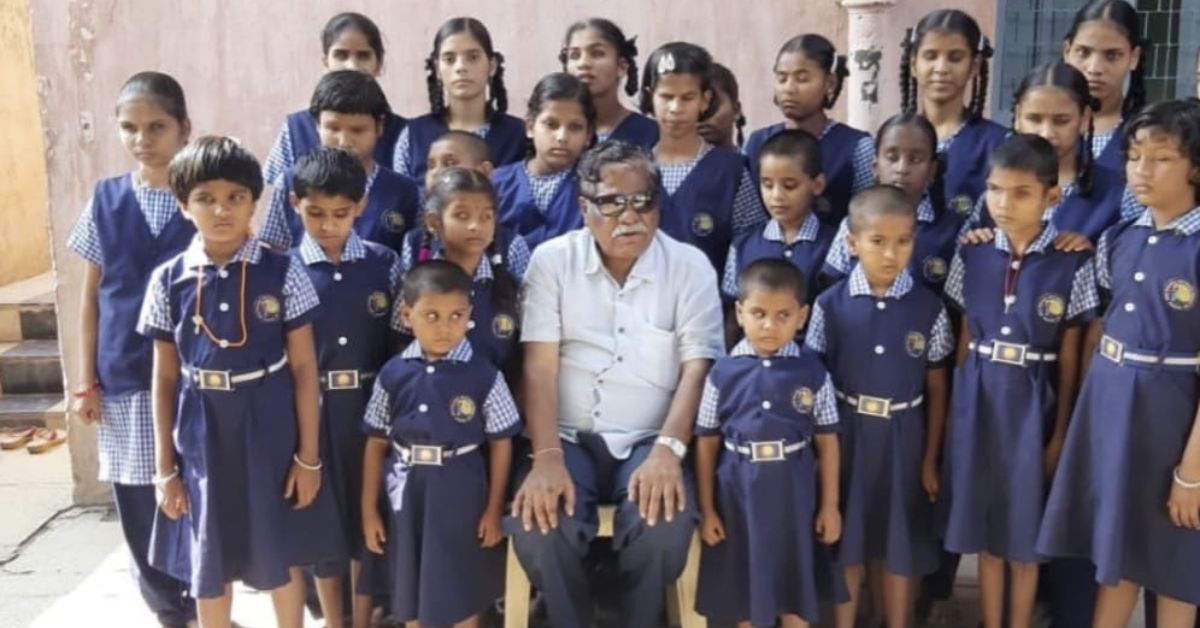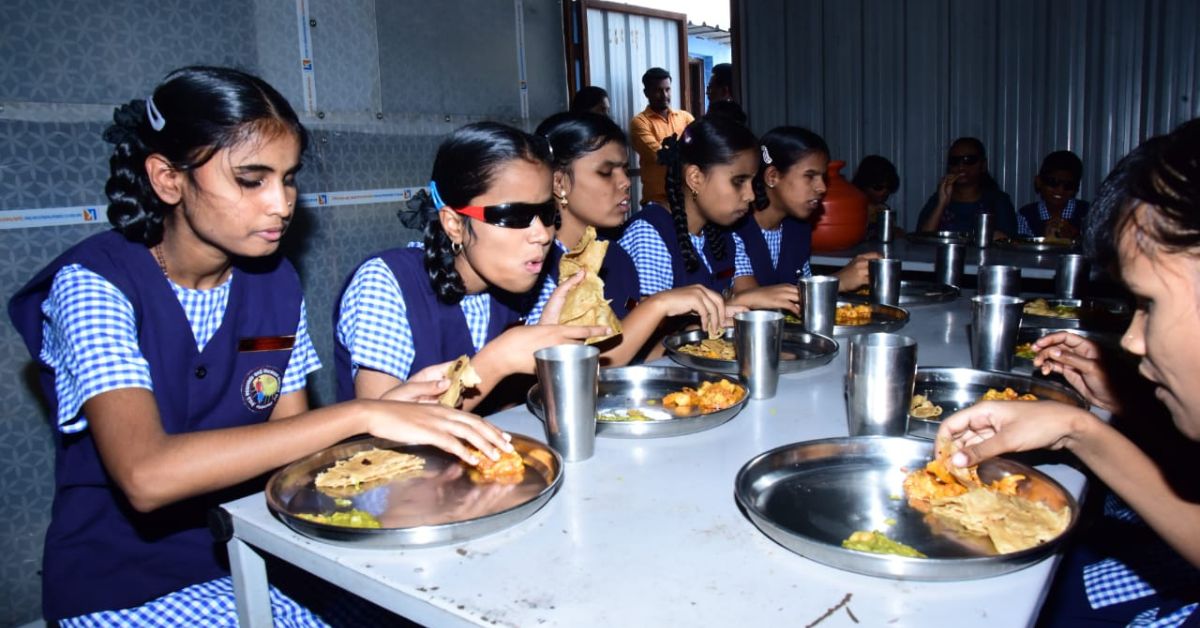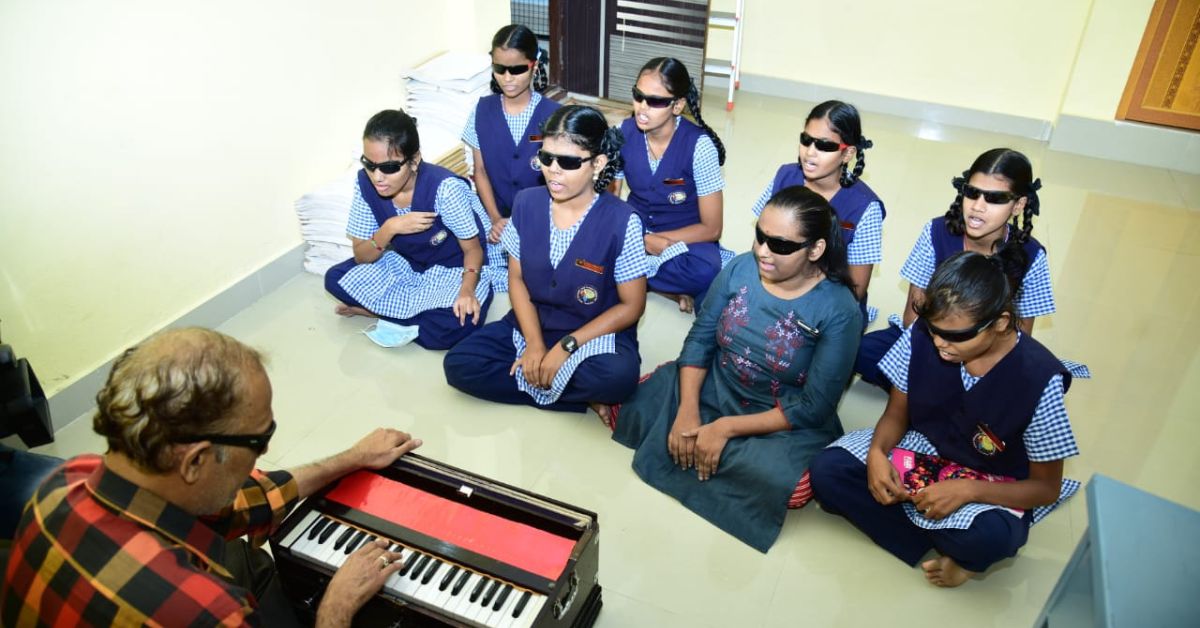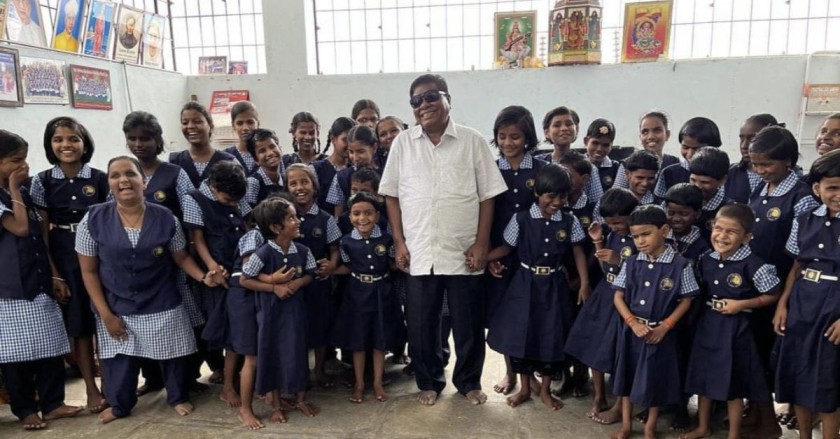“Who, if not myself?” remained an ever-present query that fueled the determination of Dattu Agarwal, now 66 years old. Living with visual impairment, Dattu consistently pondered over the lives of individuals akin to his own.
“Having been fortunate to receive quality education and the backing of a supportive family, I couldn’t ignore the stark reality that numerous others were not as privileged as I was,” he reflects in conversation with The Better India.
This reality, he adds, triggered in him an urge to extend a helping hand to those in need.
Presently, he is a guardian and teacher to 75 girls living with visual impairment. Within the precincts of his boarding school nestled in Kalaburagi, Karnataka, these girls are provided with more than just academic instruction — they are also given clothing, shelter, and a chance at life.
“In many areas of India, girl children are still looked upon as a burden. I can’t even imagine what life would entail for girls with disabilities,” says Dattu, adding that he wants to give them an avenue to building a life of independence.
‘Fate brought me here’
Born and raised in Kalaburagi, Dattu suffered a bout of pneumonia at the age of three, which led to his visual impairment. “I don’t remember the world before I lost my vision. My parents were worried, but also quite determined to make me self-sufficient and independent. They sent me to a blind school for boys in Kalaburagi at the age of 8,” he recalls.
After completing his schooling, Dattu went on to study political sciences in Gulbarga University. “In 1985, I started to teach in the same university. I taught political science for more than 35 years,” he says.

While Dattu progressed in his life, he never felt that his impaired vision was like a disability to him. For others, he notes, this was not the case. “Comments like ‘What will he do now?’ and ‘He is disabled and will be a burden’ were quite common. Such comments take a toll on your mental health too. I wanted to create an environment where there is no such prejudice,” he says.
“I found it very difficult to find my footing. There were enough avenues to help me grow and succeed in life,” he notes. “[But] I could see people from my community suffering, especially little girls. There were schools for boys but none for girls in my district back in the 2000s,” he adds.
He started saving and brainstorming ideas to help people with visual impairments.
“In 1990, I laid the foundation of a trust by the name Hyderabad Karnataka Disabled Society. Under this, I also founded a residential school for visually impaired girls. The girls belong to underprivileged sections of society.”
A chance at life and success
Dattu named the school Matoshree Ambubai Residential School for Blind Girls after his mother. “It was my mother who was my backbone and biggest supporter. Whenever voices from the society became too much, she would rescue me and remind me that I can do anything if I wanted to,” he recalls.
“My mother is also my biggest motivation and inspiration. She has taught me everything I know about life and society. She was a woman of remarkable perseverance and warmth,” he adds.

When Dattu started the school, he had only four girls with him. “I went to villages in Kalaburagi district to talk to parents and tell them about the school. The parents did not want to send their girls to blind school because they feared for their safety,” he says.
“As they belonged to underprivileged sections, they did not understand the need for educating their visually impaired girls and making them independent,” he notes.
‘Need more schools like ours’
The girls at Dattu’s school are from six districts — Kalaburagi, Bidar, Yadgir, Raichur, Koppal and Bellary.
“Initially, we intervened and went to villages to find girls with visual impairments who needed help, but within a few months, the scenario changed. People would hear about us and approach us directly,” he informs.
“Apart from following the regular syllabus, we also train them in sports and music. This gives them more options and passions to follow when they move out of the school,” he adds.
Among them is Idhma, who wants to be a lawyer. “My parents found out about Dattu sir’s school when we were at an eye camp in Hyderabad. I moved to the school and joined Class 7. Initially I missed my home, but everyone here helped me settle in. I want to study harder and become independent so that I can help my parents out financially,” she says.
Meanwhile, Muskan (12) , who studies in Class 5, says, “I left my village Madanapura four years ago so I could get a better education here. Before this, I did not go to any school as my parents could not afford the fees. The school teachers and staff are very polite and make us feel comfortable.”

Sangeeta D Thakur, the head mistress of the school ponders on the importance of such schools. “There are very few avenues for girls in Karnataka. Schools like ours, which give free education and residence to the children, are the need of the hour. If these children don’t get education, they will end up in a sorry state. When I see them, all I see is talent and creativity. We have had seven batches of girls who have completed their education here and have gotten into good colleges,” she says.
Reflecting on his journey, Dattu says, “I believe that the turn of events when I was a child and everything that followed in my life was fate. My life would have been very different if I had not lost my vision back then.”
How can you help?
Dattu’s school has 75 girls, but for the last one year he has stopped taking new admissions.

“We have been overburdened with new admission requests. While I want to take every girl that I can, we do not have any space left in the dormitories,” he says.
A new building is under construction and the school is in need of funds. “For so long the school has been running on my income and from donations from different sources. However, now that I have retired too, we are looking for more avenues of money,” he explains.
If you wish to help Dattu in his cause or fund the education of the girls, you can reach out to him at 95353 93900.
Edited by Divya Sethu
No comments:
Post a Comment